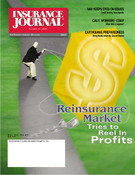Retail agents know where to turn when they have a specialized need, a difficult coverage to place, or any kind of excess or surplus line of business: the managing general agent. Due to the broad range of coverage options and risks that MGAs handle, reinsurance is a key component of most managing general agents’ business.
The core function of reinsurance is to provide indemnification and reimbursement for payments already made. Therefore, reinsurance should play an important role in any insuring organization’s strategy to minimize risk and maximize value. The current hard market environment places an even greater importance and emphasis on the role of reinsurance throughout all levels of the industry. That’s just one more reason why it is critical that those in the independent wholesale distribution segment of the industry, and those who do business with independent wholesalers, understand the role of reinsurance.
In many cases, reinsurance pricing drives market pricing. Over the past several years, reinsurance companies have shown very poor results, somewhere in the 140 percent combined ratio range. No one can afford to lose 40 cents on the dollar. As a result, a number of reinsurers have exited the marketplace, putting pressure on those remaining to fill the gap. Remaining companies have increased prices substantially and decreased commissions in an attempt to generate an underwriting profit. Those price increases are passed on to the issuing companies who in turn pass on these restrictive terms to their insureds.
MGAs work both indirectly and directly with reinsurers. Indirectly, they will be concerned about the reinsurance held by a market for which they place coverage, particularly for specialty or excess and surplus lines coverage. But MGAs also work directly with reinsurers in developing programs. This may take many forms.
An MGA may have a program with a market that is exiting the business and is looking for a way to continue writing that program. In these cases, the MGA will try to find a company to write the program. It is sometimes easier to do so if the MGA has reinsurance support for the program already in place. Often, reinsurers and reinsurance brokers will help the MGA find an issuing company to be the insurance carrier for the program.
Another example is if the MGA recognizes a niche in the marketplace where there are few or no carriers interested in writing a specific line of business. The MGA in those cases will structure a reinsurance program where it is possible to generate an underwriting profit. Then the MGA will offer the program to potential issuing companies.
In still other cases, some insurance companies do not have the capacity to offer the limits needed for a particular risk. Here, the MGA would try to place facultative reinsurance on the portion of the risk that the insurance company is not willing to write.
In any situation in which an MGA works directly with a reinsurer to develop a program, the retail agent has a responsibility to develop a clear understanding of the arrangement. Retail agents working with MGAs should look closely at the issuing company paper. In most cases, a strong insurance company will only accept reinsurance from an A.M. Best rated “A XII” company.
Many companies that “sell” or “front” their paper have reinsurance placed by the program manager or the MGA. The ability of these companies to pay claims is directly tied to the quality of the reinsurance behind the program. There have been a number of these companies that have not survived in the recent past largely due to uncollectable reinsurance.
Questions the retail agent should ask that a qualified managing general agent can answer include: • How much experience does the general agency have with this type of program? • What is the issuing company’s Best or Standard & Poor’s rating? • How much reinsurance does the company purchase and what is the quality of that reinsurance? (This information can easily be found in the insurance company’s annual report.) • Is the reinsurer rated the same or better than the primary carrier? • How often does the primary company audit the general agency? • How often does the reinsurer audit the book of business? • Who handles claims—the general agency, or a third-party administrator?
Retail agents, risk managers and others benefit from being aware of what their markets and their MGAs look for when selecting a reinsurance carrier. Many of the principles are the same as those in selecting any market. Avoid companies that will not be around to pay your claims. Don’t use companies that will not support you. Make sure the financials are sound and that the insurance rating agencies have given the reinsurer high marks. Stay away from companies that are difficult to deal with or are not responsive to your needs. Forget about companies that will not honor their obligations to you.
Robert S. Giles, the 2002-03 president of the American Association of Managing General Agents, is president and COO of R.W. Scobie Inc. and affiliated companies with offices in Eau Claire, Wis., Minneapolis, West Des Moines, Iowa, and Omaha, Neb.
Was this article valuable?
Here are more articles you may enjoy.


 What Analysts Are Saying About the 2026 P/C Insurance Market
What Analysts Are Saying About the 2026 P/C Insurance Market  Florida Insurance Costs 14.5% Lower Than Without Reforms, Report Finds
Florida Insurance Costs 14.5% Lower Than Without Reforms, Report Finds  Trump’s Repeal of Climate Rule Opens a ‘New Front’ for Litigation
Trump’s Repeal of Climate Rule Opens a ‘New Front’ for Litigation  AIG Underwriting Income Up 48% in Q4 on North America Commercial
AIG Underwriting Income Up 48% in Q4 on North America Commercial 


